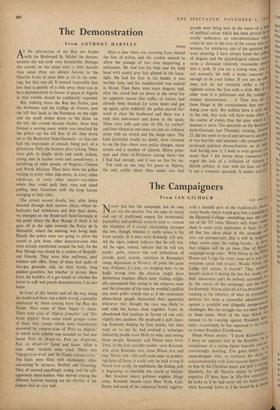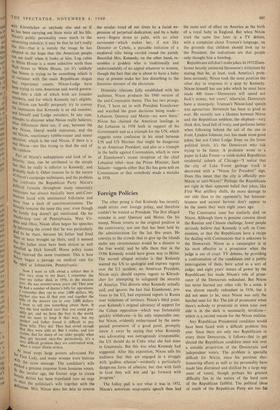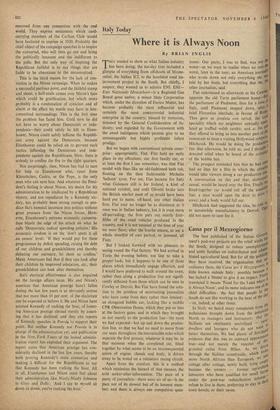The Campaigners
From IAN GILMOUR LOS ANOIL° NIXON has lost the campaign, but he may yet win the election. For the sake of clarity and out of traditional respect for ceremonial, journalists and political analysts tend to assume the existence of a causal relationship between the two, though whether it really exists is far from certain. If it does exist Kennedy will win. All the signs, indeed, indicate that he will win. All the signs, indeed, indicate that he will win easily: polls, relative size and enthusiasm of crowds, party morale, optimism in Kennedy's camp, depression in Nixon's, all point the same way. Pollsters, it's true, are hedging bets—to be badly wrong over the election might have deleterious business effects later. Gallup origin- ally announced that owing to the religious issue and the closeness of the race he wouldn't publish any more polls—which was as if the racecourse photo-finish people dismantled their apparatus whenever they thought the race was likely to end with the horses close together. Later he abandoned that position in favour of one only slightly less cautious. He produced a poll show- ing Kennedy leading by four points, but then went on to say he had evolved a technique indicating people most likely to vote; and among those people, Kennedy and Nixon were level. Thus, of the four possible results—easy Kennedy win, close Kennedy win, close Nixon win and easy Nixon, win—this poll came near to predict- ing three of them; it could only be held wrong if Nixon won easily. In usefulness, the Gallup poll is beginning to resemble the oracle at Delphi.
But however much pollsters explain things away, Kennedy should carry New York, Cali- fornia and most of the industrial North, together with a sizeable part of the traditionally Demo ; cratic South, which would give him a landslide to the Electoral College—something near 400 v°1`; out of the 537 votes. Nixon's only hope-146i there is some crisis equivalent to Suez—is ill all that has taken place in the campaign wd turn out unimportant; that it will be forgotten when voters enter the voting booths: in short' : that religion will be an issue. One of Ni 71:, campaign songs runs: 'With Nixon in the Wnt House and Lodge his trusty mate we're sure thad everyone could feel secure.' Would Nixon an Lodge feel secure, if . elected? They certainly haven't looked it during the last few weeks; and their uneasiness can't be entirely accounted rge by the course of the campaign, and the surge for Kennedy. Nixon, after all, is Vice-President an running as the inheritor of what he presumably believes has been a successful administration' against a youthful and allegedly inexperiencet challenger. But the struggle has not been rough in these terms. Most of the time Nixon has seemed to be running against President Ken- nedy; occasionally he has appeared to be till" to re-elect President Eisenhower. When Nixon shouts: 'I know Khrushchev; I have sat opposite him in the Kremlin,' be reminiscent of a racing tipster hoarsely and ona convincingly shouting, 'I've gotta horse,' 0r to name-dropper who, to reinforce his claini acquaintanceship with some famous figure. jefcrs to him by his Christian name and gets it wr"7. Similarly, for all Nixon's claims to trovehl_1.g l, expertise CI have been in fifty-five countrte'n'; he looks as if he had never left his home tc)wle while Kennedy looks as if he would be at hog' THE SPECTATOR, NOVEMBER 4, With Khrushchev or anybody else and as if he has been carrying out State visits all his life. Nixon's public personality owes much to the advertising industry; it may be that he isn't really like this—that it is merely the image he has adopted in the hope that the American people can see itself when it looks at him. Log cabin to White House is a more seductive myth than Wall Street to White House, yet it's unlikely that Nixon is trying to be something which is at variance with the main Republican slogan that experience counts. Nixon-Lodge have been trying to turn American and world govern- Ment into a club of which both are founder Members, and for which Kennedy isn't eligible; and Nixon can hardly purposely try to convey Impression mpression that Kennedy is an old member, and himself and Lodge outsiders. In any case, attempts to discover what Nixon really believes; What differences there are, if any, between the tiew Nixon, liberal world statesman, and the old Nixon,". reactionary rabble-rouser and smear sPeetalist; which is the real Nixon, if there is a teal Nixon—are like trying to find the end of the rainbow.
• art of Nixon's unhappiness and look of in- feiority, then, can be attributed to the simple fact that he really is inferior to Kennedy, and probably feels it. Other reasons lie in the nature of Nixon'sI campaign techniques, and the problem that.confronts the Republican Party. Nixon's .loal formula throughout many unsavoury °Paigns has always basically been anti-Com- ril•°lam laced with sentimental folksiness and more than a dash of sanctimoniousness. The formula remains the same this year, even though the family dog doesn't get mentioned. On his whistle-stop tour of Pennsylvania, West ua and Ohio, Nixon often began his speeches hy Informing the crowd that he was particularly 'd to be there, because his father had lived there or been brought up there, until it seemed that his father must have been almost as well 1, I ()Ceded as Dick himself. Home policy issues 14 en received the same treatment. This is how the xem began a passage on medical care for aged at Johnstown, Pennsylvania: Now I want to talk about a subject that is also very close to my heart. I remember the Year my father died, in 1956, in the election
Year. He was seventy-seven years old: That year he had a number of doctor's bills for operations. remember they ran to over 2,000 dollars. My Mother also was ill that year and together the bills of the doctors ran to over 3,000 dollars. I want to tell you something about them. It was the best medical care that you could pos-
siblY get, and we have the best in the world,
and we want to keep it that way; but my Mother and father found it difficult to pay those bills. They did. They had saved enough that they were able, to. But I realise, and you realise, that for many of our older people, when
they get beyond sixty-five particularly, it's a very difficult problem they arc confronted with, When a major illness strikes. At most stops large posters advocated Pat r First Lady, and many women wore buttons with the same message. The candidate's wife elinked a genuine response from feminine voters. female this secular age, the former urge to create to deities has been translated into an urge p elect the politician's wife together with the di • timan. Mrs. Nixon does her best to reverse the secular trend of our times by a facial ex- pression of perpetual dedication, and by a baby wave—fingers down to palm, with no other movement—which makes her, if not like Demeter or Cybele, a passable imitation of a mediaeval relic being carried round the parish. Beautiful Mrs. Kennedy, on the other hand, re- sembles a goddess who is traditionally and understandably of no appeal whatever to women, though the fact that she is about to have a baby may at present make her less disturbing to the feminine element of the electorate.
Domeatic relations gully established with his audience, Nixon produces his 1960 version of the anti-Communist theme. This has two prongs. First, 'I have sat in with President Eisenhower and watched the great decisions being made— Lebanon, Quemoy and Matsu--we were there.' Nixon has claimed the American landings in the Lebanon in 1958 both in support of his Government and as a triumph for the UN, which suggests some confusion in his mind between UN and US Marines that might be dangerous in an American President; and also as a triumph in the battle against Communism, which, in view of Eisenhower's recent reception of the chief Lebanese rebel—now the Prime Minister, Saeb Salaam—suggests either that Ike has gone soft on Communism or that somebody made a mistake in 1958.
Foreign Policies
The other prong is that Kennedy has recently made errors over foreign policy, and therefore couldn't be trusted as President. The first alleged mistake is. over Quemoy and Matsu. On his stump, Nixon reverts to the original position in the controversy, not one that has been held by the administration for the last five years. He conveys to the crowds that to give up the islands under any circumstances would be a disaster to the free world; and he tells them that in the 1930s Kennedy would have given way to Hitler. The second alleged mistake is that Kennedy wanted the US to apologise and express regrets over the U2 incident; no American President, Nixon says, should express regrets to Khrush- chev for attempting to safeguard the security of America. This distorts what Kennedy actually said, and ignores the fact thit Eisenhower, pre- vious to the U2, had expressed regrets to Russia over violations of territory. Nixon's third point, over Kennedy's original advocacy of support for the Cuban opposition—which was fortunately quickly withdrawn—is his only respectable one; but Nixon, evidently embarrassed by the unex- pected possession of a good point, promptly threw it away by saying that what Kennedy was advocating was outrageously irresponsible; the US should do in Cuba what she had done in Guatemala. But this was what Kennedy had suggested. After this exposition, Nixon tells his audience that they are engaged in a struggle with 'godless atheism'—evidently a particularly dangerous form of atheism; but that with faith in God they will win and `go forward with progress.'
The folksy pull is not what it was in 1952. Nixon's notorious soap-opera speech then had the same sort of effect on America as the birth of a royal baby in England. But when Nixon tried the same line later in a TV debate, with a complaint about Truman's language, on the grounds that children should look up to the President, the indications are that people • only thought him a humbug.
Republicans still don't make jokes. In 1952 Eisen- hower heavily answered Stevenson's witticisms by stating that he, at least, took America's prob- lems seriously; Nixon took the same position the other day in response to a quip by Kennedy. Nixon himself has one joke which he must have made 400 times—'Democrats will spend not Jack's money, but yours'; otherwise, Democrats have a monopoly. Truman's Nixon-land speech was uproarious. Stevenson has been as good as ever. He recently saw a likeness between Nixon and the Republican emblem, the elephant—very thick skin, head full of ivory, and performs better when following behind the tail of the one in front. Lyndon Johnson, too, has made some good jokes; but not Cabot Lodge. Even on the lower political levels, it's the Democrats who risk trying to be funny. A professor wrote to a paper in Lake Forest—a mink-stoled Republican residential suburb of Chicago-1 notice that the city of Lake Forest garbage truck is decorated with a "Nixon for President" sign. Does this mean that the city is officially pro- Nixon or anti-Nixon?' Perhaps the Republicans are right in their apparent belief that jokes, like First War artillery shells, do more damage to our side than to the opponent's; but humour- lessness and earnest fervour don't appear to be the assets they were eight years ago.
The Communist issue has similarly died on Nixon. Although there is genuine concern about the Russian and Chinese challenge, fewer people seriously believe that Kennedy is soft on Com- munism, or that the Republicans have a recipe for dealing with Communism that is unknown to the Democrats. Nixon as a campaigner is at his most effective as a prosecutor when the judge is out of court. TV debates, by providing a confrontation of the candidates and a public interrogation of them, have acted as a sort of judge; and eight years' tenure of power by the Republicans has made Nixon's role of prose- cutor 'of the Democrats redundant. But Nixon has never learned any other role. In a sense, it was almost equally redundant in 1956, but it did not seem to be, since Nixon was only the hatchet man for Ike. The job of prosecutor when there's nobody to prosecute or when your own side is in the dark is necessarily, invidious— which is a second reason for the Nixon malaise.
Any Republican Presidential candidate would have been faced with a difficult problem this year. Since there are only two Republicans to every three Democrats, it follows. that to get elected the Republican candidate must win over a sizeable proportion of the Democratic and independent voters. The problem is specially difficult for Nixon, since his previous elec- tioneering efforts as well as his personality have made him distrusted and disliked by a large seg- ment of voters, though perhaps his greatest difficulty lies in the nature of the hard core of the Republican faithful. The political ideas of much of the Republican Party are too far removed from any connection with the real world. They express sentiments which card- carrying members of the Carlton Club would have hesitated to express in 1920. Probably the chief object of the campaign speeches is to inspire the converted, who will then go out and bring the politically innocent and the indifferent to the polls. But the only way of inspiring the Republican faithful is to say things that are liable to be obnoxious to the uncommitted.
This is the third reason for the lack of con- viction in the Nixon campaign. When he makes a successful partisan point, and the faithful stamp and shout, a half-smile comes over Nixon's face which could be gratification, but which more probably is a combination of cynicism and of alarm at the effect his words may have in less- committed surroundings. This is the first time the problem has faced him. Until now he did not have to worry about Democrats or inde- pendents—they could safely be left to Eisen- hower. Nixon could safely inflame the Republi- can army against the Democrats, because Eisenhower could be relied on to prevent such tactics inflaming the Democrats and inde- pendents against the Republicans. Now, there is nobody to confine the fire to the right quarters.
Not surprisingly, then, Nixon has had to turn for help to Eisenhower who, apart from Khrushchev, Castro, or the Pope, is the only man who can save him. And whatever the Presi- dent's feeling is about Nixon, his desire for his administration to be vindicated by a Republican victory, and not repudiated by a Kennedy vic- tory, has probably been strong enough to pro- duce Ike's biennial incursion into politics without great pressure from the Nixon forces. How- ever, Eisenhower's extreme economic conserva- tism blunts the edge of his attack on what he calls `Democratic radical spending, policies.' His economic wisdom is on the 'don't spent it all on sweets' level : 'If they would pay for these programmes by deficit spending, raising the debt of our children and grandchildren and thereby debasing our currency, let them so confess.' Many Americans feel that if they can look after their children by improved education, etc., their grandchildren can look after themselves.
Ike's electoral effectiveness is also impaired on the foreign affairs issue. His and Nixon's assertion that American prestige hasn't fallen during the last few years is so obviously untrue that not more than 45 per cent. of the electorate can be expected to believe it. He and Nixon have accused Kennedy of rocking the boat, of lower- ing American prestige abroad merely by assert- ing that it has declined; and they cite reports of Kennedy speeches in Pravda to support their point. But neither Kennedy nor Pravda is in charge of the administration yet; and publication in the New,York Times of the leaked adminis- tration report has exploded their argument. The report states that American prestige has con- siderably declined in the last few years, thereby both proving Kennedy's main contention and making it difficult for the Republicans to say that Kennedy has been rocking the boat. All in all, Eisenhower and Nixon must feel about their administration like Nicely-Nicely Johnson in Guys and Dolls: 'And I say to myself sit down sit down, you're rocking the boat.'
















































 Previous page
Previous page